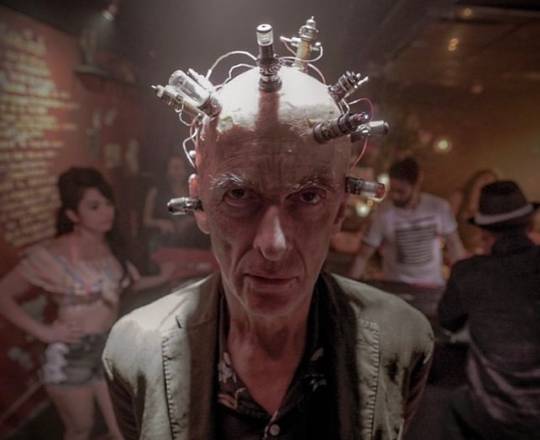#american thinker
Text
i love bands where the singer can’t sing but can convey emotions though their singing in a way that is impossible to describe. like yes u sing like an absolute dickhead but you are also somehow expressing exactly how i feel through the cracks in your voice
#car seat headrest is the best example of this#but there are so many examples#midwest emo in general is often like this#or like music with midwest emo vibes#cshr#csh#car seat headrest#midwest emo#the front bottoms#macseal#modern baseball#american football#american football band#music#atlas the thinker#personal
5K notes
·
View notes
Text
One of the things I find utterly delightful about NuWho is how all of the actors who have played the Doctor have gone on to play deranged villainous characters in comic book adaptations.




All of which is to say that I'm eagerly awaiting the Unhinged Villain chapter of Jodie Whittaker's career.
#doctor who#the doctor#i guess most of this is because Americans still use the Evil Brit character trope but still#it's like the bbc's casting department was like Who Could Also Convincingly Play The Master and just used that as their main criteria#chris eccleston#david tennant#matt smith#peter capaldi#thor the dark world#malekith#jessica jones#kilgrave#morbius#milo morbius#suicide squad#the thinker
796 notes
·
View notes
Text
Much of the social history of the Western world over the past three decades has involved replacing what worked with what sounded good.
Thomas Sowell, Source Unlisted.
#philosophy tumblr#philoblr#philosopher#thinker#american authors#writrblr#thomas sowell#economics#politics#governance#social policy#ideology#nationalism#dark academia#life quotes
8 notes
·
View notes
Text
One thing about Green Day that's very funny is when you talk to older punks who have been in the scene for a long time they'll be like "yeah Green Day is punk" and normies will be like "yeah Green Day is punk". And if you try to tell a firm emo Green Day is emo they'll get amnesia about all the hours logged sobbing openly with the American Idiot album on repeat and they'll insist "Green Day isn't Emo it's Punk" as if those two things are mutually exclusive.
But when you ask younger punks who are not hanging out in the emo or goth overlap they'll go "Green Day isn't Punk, it's pop punk at best. Real punks use chainsaws instead of instruments."
And you know what. I think that's beautiful. Genre is subjective.
#green day#i havent taken a servey or anything ive just passively existed in punk and post punk subcultural spaces online and irl#so called free thinkers from all of these groups when American Idiot comes on: starts headbanging
6 notes
·
View notes
Text

#james baldwin#writers#literature#american writer#poet#playwright#thinker#african american history#quotations
2 notes
·
View notes
Text

HOW IS HE AN UNCOMMONNNN
#silver-shaded#pollen eyelashes#misty#gummy#distinct tortie#the thinker eyebrows#slim tail#american shorthair#roll short ears#tanzanite#uncommon#qrcatzz#circle pupils#male#dream cat paradise#shy#shaded
3 notes
·
View notes
Text
I've been on a kick of re-listening to mewithoutYou, including their last concert performances, and it's really quite interesting to see how they are received on youtube. lots of their shows and interviews have been uploaded by channels called things like "Christian Rock and Metal Nostalgia" which is, 1. an interesting phenomenon to see, as someone who grew up in a very Christian area in the heyday (as I remember it anyway) of mainstreamed Christian rock, but in a place (the South) that didn't really, for example, have anything you could describe as "Christian metal" on the radio, so what that scene consisted of is a mystery to me and 2. interesting since I wasn't a fan of the band when they were breaking out nor when they were touring a lot, and I never understood how deeply they seem to have been listened to inside what I guess are Christian metal fan communities? and finally 3. interesting since notwithstanding their previous circulation and/or deliberate presence in some Christian music scenes, I cannot really get my head around someone unironically categorizing them as a "Christian band." As a tongue-in-cheek thing, I would get it. but as a straightforward descriptor it would be both reductive and wrong, at least to me.
#idk I think Weiss is definitely an idiosyncratic and uh syncretic religious thinker#who has deliberately courted Christian affiliations at times lol#but hmm some of it just feels like American islamophobia writ small over a particular fandom#idk I feel like most of the fans just like this particular type of hardcore or post hardcore or whatever#but there's definitely a sense of Jesus tinted glasses if you will#perhaps just general Christian American inability to pick up on allusions NOT from that tradition
0 notes
Text
Cómo se enriquecieron los Clinton, Obama y Biden? ¿Y cómo lo hizo Trump?
Imagen archivo
Por Jack Hellner
Con todo el enfoque en el presidente Trump y sus problemas legales, surge la pregunta: ¿Cómo se hizo rico Trump? ¿Y cómo se enriquecieron ahora las élites demócratas que lo perseguían?
Comencemos con los Clinton:
¿Cómo se enriquecieron los Clinton?
Los Clinton no se arriesgaron, no hicieron inversiones y no pidieron dinero prestado. No, simplemente usaron la…

View On WordPress
0 notes
Text
In his seminal The Wretched of the Earth, Frantz Fanon could be writing about Gaza when he said: “In all armed struggles, there exists what we might call the point of no return. Almost always it is marked off by a huge and all-inclusive repression which engulfs all sectors of the colonial people.”
In Israel, Gaza and the West Bank, that point has arrived.
From Gaza to the Red Sea, on all fronts the West is now unmasked as a lawless killing machine in terror of losing control. Genocide, starvation and war, defended with Olympic-level diplomatic double-speak, are its only answers to the fact that the Global South, and the nations of the Middle East (if not their leaders) no longer wish to live under US hegemony.
Jean-Paul Sartre, in his preface to Fanon's work, wrote of western colonialism: “Our Machiavellianism has little purchase on this wide-awake world that has run our falsehoods to earth one after the other. The settler has only recourse to one thing: brute force… the native has only one choice, between servitude and supremacy.”
Fanon was a revolutionary thinker and a practising psychiatrist of colonial racism and its psychic impact on the colonised, and the coloniser. He and Sartre were writing about France’s imminent defeat in Algeria after seven years of brutal war.
[...] Western powers are involved in conflicts thousands of miles from home, as they were in Fanon's time in Algeria, Congo and Indochina. Today the western political class has united behind Ukraine and Israel, but for millions of people it is no longer clear that the wars are worth fighting.
As Yemen’s spokesman, Mohammed al-Bukhaiti, put it: “The war today is between Yemen which is struggling to stop the crimes of genocide, and the American and British coalition [who] support its perpetrators. Every party or individual in this world has two choices that have no thirds… who do you stand with as you watch these crimes?”
Fanon, writing 63 years ago, agrees: “The colonial world is a Manichaean world… at times this Manichaeism goes to its logical conclusion and dehumanises the native, or to speak plainly, it turns him into an animal. The native is declared insensible to ethics; he represents not only the absence of values, but the negation of values… he is the enemy of values, and in this sense he is the absolute evil.
“The native knows all this, and laughs to himself every time he spots an allusion to the animal world in the other’s words. For he knows he is not an animal, and it is precisely at the moment he realises his humanity that he begins to sharpen the weapons with which he will secure victory.”
. . . full article on MEE (1 Feb 2024)
You can also find a free copy of Fanon's The Wretched of the Earth on the Internet Archive (available as a PDF, EPUB etc.)
1K notes
·
View notes
Text
Man fucking Bungou Stray Dogs, how the FUCK am I supposed to explain the plot to anyone anymore.
"This broke ass twink finds out he's a tiger, gets semi-adopted/hired by a band of traumatized ability users (read a book to understand each one), BUT WAIT, there's an EVIL group of ability users with MORE traumatized bisexuals. Uh oh, tiger twink has a rival (they both have daddy issues), wait is that the AMERICANS PLANNING TO BOMB JAPAN WITH A FLYING WHALE??!! Here's the fucking thinker over here (read: Dazai[Ranpo]). Let's take ibuprofen together. Okay Mr. Fitzgerald is gone (not really, you can't get rid of him)- SHIT it's the RUSSIANS!! Who is that rat? It's FYODOR DOSTOEVSKY?! He's ALSO the thinker. NOOO grandpa soukoku don't die!! Shin Soukoku epic montage. Cool, we're safe- JUST KIDDING!! THERE'S A BOOK THAT RE-WRITES SHIT AND THE RAT HAS IT AND THERE'S NOTHING YOU CAN DO ABOUT IT! "and I, Lelouch Vi Britanni- I mean Fukuchi Ouchi, will nuke the earth using my vampire army with security clearance from the United Nations. I hope my ex-husband Suzaku Kururugi Fukuzawa Yukichi doesn't try to stop me!"
#bungou stray dogs#osamu dazai#atsushi nakajima#ryunosuke akutagawa#fukuchi ochi#fukuzawa yukichi#ranpo edogawa#fyodor dostoevsky#francis scott fitzgerald#chuuya nakahara#port mafia#armed detective agency#the guild bsd#bsd
1K notes
·
View notes
Text

harlem pin-up locs ♥️
here’s a 1920s-inspired pin-up dreadlock twist hairstyle that is a modern take on the finger wave hairdo. finger waves have been a staple in the black community for decades as it was very popular during the 1920s, 1930s, 1990s, and even now as we enter the 2020s. this hairstyle was largely inspired by these two pictures here and here so huge credit to the hairstylist aggie_hair on ig for making this beautiful innovation! my hair is named after the new york neighborhood of harlem and specifically the harlem renaissance. if you don’t know, the harlem renaissance or the “new negro movement” was a vibrant african american cultural movement that happened during the 1920s and 1930s. similar movements also happened in other cities throughout the american north due to the occurrence of the great migration where thousands of african americans moved up north to escape violent racial discrimination and persecution enforced by the racist jim crow laws in the deep south (although life in the north wasn’t that much better). i would love to say more as this is one of my favorite historical periods to research/learn about like ever but, i highly encourage y’all to do your own research on it (especially if you’re nonblack and/or not familiar with african american history) and learn about the several artists, thinkers, and innovators of that time period! tysm for reading and again tysm to my lovely testers! <333
base game compatible (bgc)
maxis palette (24 swatches)
teen-elder
fem frame
ear clipping
not hat compatible (some accessories can fit!)
custom thumbnails
disallowed for random
high poly warning!!! i haven’t had any issues with it yet but shit happens so be cautious!
all lods (lod 0: 37k poly | lod 1: 25k poly | lod 2: 20k poly | lod 3: 10k poly)
the baby hairs as seen above are not included! i highly recommend downloading these by @ceeproductions or any other baby hair cc to make the hair cuter and customizable!
please tag me if you do use my cc! i would absolutely love to see it! also, please let me know if you encounter any issues with my cc! here’s my tou. i hope y’all enjoy it <3
download via simsharefile (sfs) or on patreon - ALWAYS FREE!
tysm to cc rebloggers! @public-ccfinds @sssvitlanz
#ts4#sims 4#ts4cc#ts4 cc#the sims 4#black simblr#the sims#black simmer#sims 4 cc#sims4#ts4mm#ts4 historical#ts4mm hair#sims 4 maxis match#historical cc#ts4 historical cc#publicccfinds#ts4 maxis match#🪐 cc#saturngalore
624 notes
·
View notes
Link
One need not weep for the original-flavour TERFs, whose intentions towards trans women, in particular, were always genocidal; Raymond, explicitly, said that her goal was for trans people to no longer exist. Yet, in 1979, that hatred was much less potent than it is today. TERFism was one pocket of a relatively powerless movement which did not have the reach nor backing of the broader right wing. Yet, as a pre-existing hate group “on the left,” TERFs were incredibly easy for fascists to infiltrate and absorb.
A 2020 article from Radix Journal, a far-right publication founded by the neo-Nazi Richard Spencer, lays out a strategy for doing just that. In the article, entitled “The TERF to Dissident Right Pipeline,” author Kat S. notes that TERFs’ insistence on “biological sex” as an immutable binary—all “men” depraved and violent, all “women” fragile victims—may make it easier to convince them of other biological hierarchies. Their insistence on seeing trans women as “violent men,” in particular, can be weaponized against men of colour and turned into overt white supremacy. “It doesn’t take any thinking woman long to see exactly which men are committing violent crime and the majority of partner violence, and race realism is a natural next step.”
Ultimately, the article reasons, it should be easy to convince TERFs that supporting the rights of “biological women” means rejecting “the mid-to-late 20th century Jewish-led feminist theory,” particularly the “corporate slavery” of work outside the home, in favour of accepting their biologically ordained role as wives and mothers. “A pro family, pro natalist movement requires some degree of female participation,” Kat S. writes, “and reframing the patriarchy paradigm is essential.” Ultimately, TERFs must be led to see patriarchy as “a system where men’s urges and strengths are allowed to flourish and channeled into healthy outlets, and women are protected and respected for their material reality and the gifts our unique biology affords.”
It’s a grim irony that, by insisting on a “feminism” without any trans women in it, TERFs have wound up constructing the tool by which fascists aim to destroy feminism altogether.
9K notes
·
View notes
Text
Something about the way Lenny and Dutch's conversations go. The real lived experience of someone who at 19 has born the brunt of American bigotry and come out an intelligent and well spoken young man...vs Dutch "fake activist" Van der Linde who never puts his money where his mouth is. Lenny is arguably a parallel to Jack (becoming an outlaw after avenging his father's murder, despite parents having greater dreams for him) and his death really plays a great role in the whole story. People who should have lived better. The cycle of revenge, of violence claiming bright young kids.
Still, its Lenny who calls out the flaws in Dutch's thinking. He isn't afraid to ask questions, to hold intellectual conversation with the man he looks up to. I think that's also why Hosea likes him so much, because he's what Hosea wishes Arthur and John could be. Thinkers. They aren't stupid by any means, but neither pushed against Dutch until it was too late. They were enablers, same as Hosea. I think the deaths of Lenny and Hosea, the thinkers, is a much deeper start to the downfall of the gang. Metaphorically, it's the loss of rational mindedness. The wise youth and wise elder.
251 notes
·
View notes
Text
Emma Saltzberg: Your book chronicles a longstanding struggle over public opinion in the American Jewish world. What are the top-level conclusions you draw from this history?
Geoffrey Levin: The first big takeaway is that this history of American Jewish concern for Palestinian rights isn’t something that started yesterday, or even in the ’60s or ’70s. It goes back to 1948. As long as there has been a Palestinian refugee issue, there has been American Jewish concern for Palestinians, especially coming from Jews who spent a lot of time in the region and were deeply exposed to Israel and to the Palestinians. The second is that this American Jewish engagement with Palestinian rights was frequently influenced by state actors. Sometimes it was the Arab League [an organization of Arab states formed in 1945 to advance their shared interests], sometimes it was the CIA—but most often it was the Israeli government. I uncover this long record of Israeli diplomats trying to manage American Jewish discourse. And the last key point is that American Jewish groups were having nuanced and complicated debates in this period, as early as the ’30s, about the relationship between anti-Zionism and antisemitism. A lot of the groups that are arguing today that there’s a strong overlap between those two things, like the AJC and the Reform movement, didn’t hold that position 70 years ago.
[...]
ES: You also write about some Jewish figures whose anti-nationalist position led them to maintain their opposition to Israel’s creation even after 1948.
GL: A more extreme version of the AJC’s position emerged through the American Council for Judaism, which was an anti-Zionist group originally formed by Reform Jewish thinkers. Before and after ’48, they were against the creation of a Jewish state, but they were not focused on the Palestinian question initially. They opposed Israel because of their anti-nationalism, thinking the state would be bad for Jews. These anti-Zionists were focused on keeping Zionism and Israeli and Hebrew culture from dominating American Jewish life. They were concerned that doing so diverted American Jewish loyalties. Yet ultimately, some within the American Council for Judaism, mostly leaders like Rabbi Elmer Berger who had a lot of exposure to Palestinians themselves, did become strong advocates of Palestinian rights. And then they got kind of nudged out of the organization.
ES: You tell the story of Breira, an anti-occupation Zionist group founded in 1973 that tried to advocate for Palestinian rights in this context of increased Jewish nationalism. What happened to them?
GL: Breira was the first national American Jewish group arguing for what we now call the two-state solution. The leaders had gone to Israel and heard from Israeli leftists and had become convinced that Palestinians couldn’t be ignored forever. They framed themselves as nice Jewish boys and girls—people who wanted what’s best for Israel and for Jewish politics. And every chance they could, they highlighted Israeli voices. But they still ended up getting eviscerated as “Jews for Fatah”—Fatah being the leading PLO [Palestine Liberation Organization] faction—after just a couple of members met with a few moderate members of the PLO. It was an early example of how no matter how much American Jews who want to recognize Palestinian rights try to burnish their Jewish and even Israeli credentials, people will push against that and question their Jewish identity. And that hurt people a lot. A lot of those figures in Breira could have contributed a lot more to the future of the American Jewish community, but they felt really burned.
ES: As you note in the book, some analysts today describe American Jews’ increased criticism of Israel and Zionism as a product of distancing from Israel. But, as the Breira story shows, this stance is often a product of very close engagement with Israel.
GL: I think this is crucial. Millennial and Gen Z Jews who are involved in the Jewish community are far more likely to have gone to Israel than people of older generations, because of all these newer subsidized programs, like Birthright. They are far more likely to have met Israeli shlichim [young adult “emissaries” from Israel] through camp or through campus Hillel, and far more likely to watch Israeli stuff on YouTube and enjoy Israeli cuisine. Younger Jews are far more likely to know Palestinians as well. In contrast, many in earlier generations may have had more positive views toward Israel, but less deep engagement with the actual place and the people living there, both Israelis and Palestinians.
In my book, those from the earlier generations who engaged with Palestinian rights did spend a lot of time over there. They knew Hebrew. When they were advocating for Palestinian rights, whether that meant self-determination, or civil rights for minorities in Israel, or a different approach toward Palestinian refugees, they often came to those conclusions from going there and talking to Israelis and talking to Palestinians.
ES: Why is it important to know this history, as we contemplate different American Jewish responses to Israel’s onslaught on Gaza today?
GL: The characters in this story are people that a lot of experts haven’t heard of before. By unearthing these stories, I show how seriously people were thinking through some of these same questions 70 years ago. I think that one of the most important chapters is this one where I am able to use the archives to put a Palestinian voice at the forefront. Fayez Sayegh was struggling to find a way that was acceptable in American public discourse to talk about Palestinian issues and Arab issues. I think it’s important to write these people back into history, because they were so eager to change the discourse.
These people all kind of failed; they were pushed out. The critical American Jews were fired. I think a lot of American Jews thought the problems would just go away. And I can’t tell you that we would have had peace if the dissenting voices had succeeded. But I do think if they had been successful in getting a more open discourse within the Jewish community 70 years ago, that we would probably be in a healthier place right now, both in terms of the American Jewish community and American discourse more broadly.
199 notes
·
View notes
Text
WHITE NARRATIVES BRAINWASH BLACKS
Psychology can go a long way to explaining who sits on top of the political and economic ladder.
Here, African-American Dr. Amos Wilson reveals how Eurocentric narratives and education purposely made Blacks feel inferior to Whites. And that, he says, has led to an acceptance of the status quo among many.
Dr Amos, who was also a Pan-African thinker, lectured at New York University and died almost thirty years ago. But has anything changed since? Let us know your thoughts.
225 notes
·
View notes
Note
i think you do a really impressive job balancing comprehensive/concise while referencing a lot of complex frameworks(contexts? schools of thought? lol idk what to call that. big brain ideas) but if you have any readings specifically on the institution of psychiatry topic that you would recommend/think are relevant, I'd be interested. it's absolutely not a conversation that's being had enough and I want to be able to articulate myself around it
yes i have readings >:)
first of all, the anti-psychiatry bibliography and resource guide is a great place to start getting oriented in this literature. it's split by sub-topic, and there are paragraphs interspersed throughout that give summaries of major thinkers' positions and short intros to key texts.
it's from 1979, though, so here are some recs from the last 4 decades:
overview critiques
mind fixers: psychiatry's troubled search for the biology of mental illness, by anne harrington
psychiatric hegemony: a marxist theory of mental illness, by bruce m z cohen
desperate remedies: psychiatry's turbulent quest to cure mental illness, by andrew scull
psychiatry and its discontents, by andrew scull
madness is civilization: when the diagnosis was social, 1948–1980, by michael e staub
contesting psychiatry: social movements in mental health, by nick crossley
the dsm & pharmacy
dsm: a history of psychiatry's bible, by allan v horwitz
the dsm-5 in perspective: philosophical reflections on the psychiatric babel, by steeves demazeux & patrick singy
pharmageddon, by david healy
pillaged: psychiatric medications and suicide risk, by ronald w maris
the making of dsm-iii: a diagnostic manual's conquest of american psychiatry, by hannah s decker
the myth of the chemical cure: a critique of psychiatric drug treatment, by joanna moncrieff
the book of woe: the dsm and the unmaking of psychiatry, by gary greenberg
prozac on the couch: prescribing gender in the era of wonder drugs, by jonathan metzl
the creation of psychopharmacology, by david healy
the bitterest pills: the troubling story of antipsychotic drugs, by joanna moncrieff
psychiatry & race
the protest psychosis: how schizophrenia became a black disease, by jonathan metzl
administrations of lunacy: racism and the haunting of american psychiatry at the milledgeville asylum, by mab segrest
the peculiar institution and the making of modern psychiatry, 1840–1880, by wendy gonaver
what's wrong with the poor? psychiatry, race, and the war on poverty, by mical raz
national and cross-national contexts
mad by the millions: mental disorders and the early years of the world health organization, by harry yi-jui wu
psychiatry and empire, by sloan mahone & megan vaughan
ʿaṣfūriyyeh: a history of madness, modernity, and war in the middle east, by joelle m abi-rached
surfacing up: psychiatry and social order in colonial zimbabwe, 1908–1968, by lynette jackson
the british anti-psychiatrists: from institutional psychiatry to the counter-culture, 1960–1971, by oisín wall
crime, madness, and politics in modern france: the medical concept of national decline, by robert a nye
reasoning against madness: psychiatry and the state in rio de janeiro, 1830–1944, by manuella meyer
colonial madness: psychiatry in french north africa, by richard keller
madhouse: psychiatry and politics in cuban history, by jennifer lynn lambe
depression in japan: psychiatric cures for a society in distress, by junko kitanaka
inheriting madness: professionalization and psychiatric knowledge in 19th century france, by ian r dowbiggin
mad in america: bad science, bad medicine, and the enduring mistreatment of the mentally ill, by robert whitaker
#sorry this is SO MANY things lmao#i wld recommend starting with harrington or scull as an intro and then maybe look at one of the more topic-specific texts#depending on what interests you specifically#book recs#psychiatry
569 notes
·
View notes